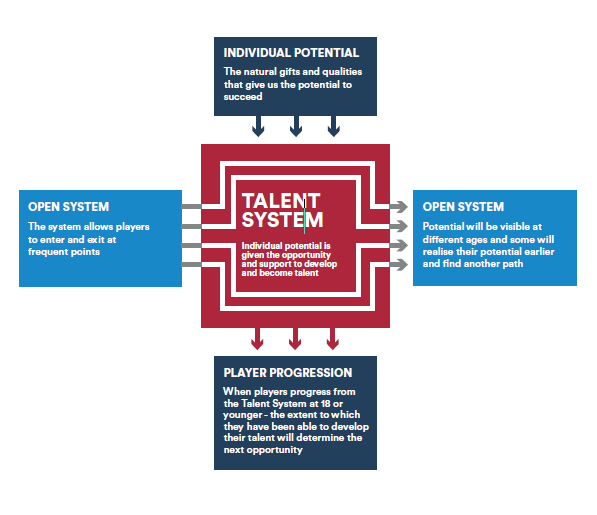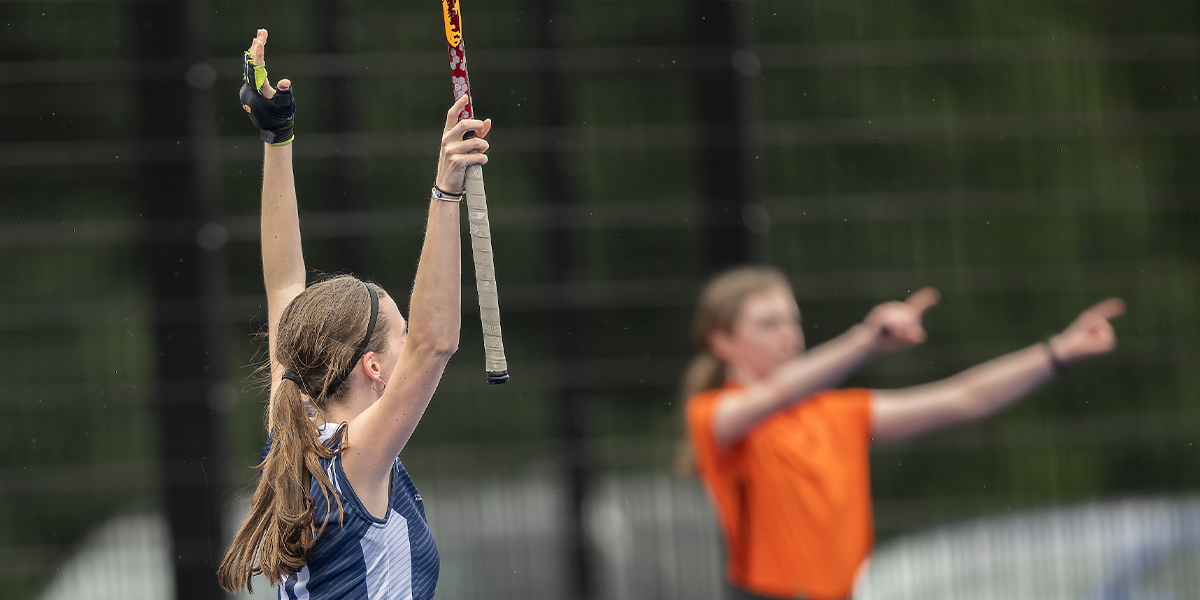We will all have our own definitions of what talent is. This may be a combination of our experiences as a player, coach, parent, our knowledge of research in this area, and what we have observed and digested from other sports, the media, and other publications.
Having a written, shared definition and understanding is not just an academic exercise; it is a fundamental piece of the puzzle that sits behind talent. It is something to come back to when we encounter problems and have decisions to make.
Talent Definition
"Talent is developed from potential. Everyone has a certain amount of ‘natural giftedness’. This natural make-up we all come with is unique to each of us and is only the starting point. We do not define this as talent, and do not describe players with an abundance of natural gifts as 'talented'. We would describe them as 'having potential'. Talent is what you develop from these natural beginnings - through experiences and training."
For example, a child with fantastic hand-eye co-ordination develops over a number of years this unique ability into a fantastic first touch, knowing exactly what angle their stick should be at and how soft their hands should be to manipulate the ball into exactly the right position for their next action - this first touch is a talent for hockey
Our Talent System

Hockey is an “early sampling, late specialisation sport”.
This means that ideally, we want players to have some experience and connection to the sport early on, the ‘sampling’. We also want them to have a broad range of sporting and athletic experiences as they develop, before focusing more on hockey in their mid-late teenage years, the ‘specialisation’. We can contrast this with an early specialisation sport such as gymnastics, where a different definition may be appropriate.
The question that could be asked is at what point do they move from “having potential” to “being talented”. We should be saving the use of the word ‘talented’ for the top performers of the game, when they consistently demonstrate their talents in Elite Competition, whether that be the domestic or international game.
You might feel the use of ‘potential’ and ‘talented’ is semantics, but studies
show that being labelled ‘talented’ (as opposed to being ‘high-potential’) can be detrimental to development. ‘Potential’ suggests players have a gap to bridge and in this way can be constructive and motivational. Being labelled ‘talented’ can give a sense of having ‘already made it’, possibly leading to some behvaiours that are less desirable.

As the young person progresses, they will go through many experiences with coaches, schools, sports, family members and peer groups which will shape the development of their talent. All individuals actively make choices, which add up over the years and will influence how their talent is developed.
We all differ in what captivates our attention. At points those with ‘potential’ may lack interest or feel less motivated. This may slow the progress of their development, but does not mean that this won’t change or shift in time. Many players have very 'bumpy' journeys on their way to the top.
-
1| Recognising talent is about future potential not just current performance
Current performance plays a part in understanding future potential but in isolation is a poor indicator and should not be relied on by itself. Other indicators of future potential are:
- Superstrengths – current superstrength of a player that sets them apart from others
- Level of all the Player Qualities
- Intent to learn – players who can respond positively to a learning stimulus. This can be a differentiating factor of potential meaning they progress faster than their peers
- Physical, psychological, social maturation – understanding how mature a person is in relation to their peers in all these three domains can indicate how much room for growth exists
- Relative Hockey and Physical Training age – determining how much time has been spent in quality environments on a hockey field and performing specific physical training can also indicate how much more room for growth there is
It is important that we continually re-evaluate our view on a player/s potential. Constantly re-assessing is critical.
2| RARE principles - Right Athlete Right Environment
A young person's experience is shaped by the environments they inhabit so matching the environment to their physical, mental and social needs at any point in time is critical to ensuring they can thrive, develop and enjoy their time.
Knowing what is right for an individual, placing the player at the heart of any decision.
You can find out more about the RARE principles on page and how to help them thrive page
3| Open, inclusive and ‘keep the net wide’ approach
We know that talent selecting talent is tricky. With this in mind, one of the most important things is that our talent system is ‘open’ with opportunities to join / re-join over many years. We have plenty of examples where players have not played age group hockey but have still been a successful senior international.
Inclusivity is about all people (irrespective of age, gender, ethnicity, religion, sexual orientation, disability) fitting in and feeling comfortable. We all have a responsibility to support one another feeling welcome and integrated.
'Keeping the net wide' refers to allowing opportunity for more players to develop their gifts over longer periods. Selection and decisions should be at ‘this point in time’ and not a final decision.
4| Multiple opportunities; multiple eyes; multiple contexts
Providing opportunity for players to perform over numerous contexts, such as training and matches in different environments, allows greater opportunity for them to demonstrate their potential.
Having multiple eyes on players, whether that be coaches, teachers, managers, or scouts, allows a more comprehensive view. Multiple opportunities allows us to work with players over a longer period of time to fully inform ourselves about the player rather than a one-off snapshot.
5| Quality and frequency of training and competition
Providing frequent, high quality, enjoyable training and competition is the bedrock of developing talent.
Partnerships between school, club, county and other stakeholders are key in providing more consistent messages to players, whilst keeping the player at the heart.




